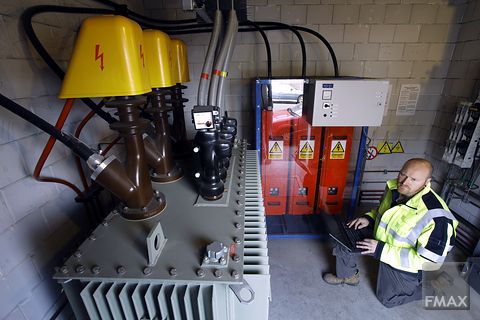How to adapt the power grid to the challenges of distributed generation and fluctuating inputs from renewable sources? Professor Lou van der Sluis presented his new book on smartgrid research last Tuesday.
“The research programme is a contribution to solving the problems we identified eight years ago,” Van der Sluis says. “Moreover, the added value is that researchers from different universities and research institutes, like ECN and Kema, have grown into a research community.”
The problems that Van der Sluis refers to are technical as well as economic. In the 1990s, the heavy electro-technical industry left the Netherlands in search of cheaper labour. Dr Lout Jonkers, from the Netherlands’ Ministry of Science and Education, assembled electrical power experts to think of new missions that could spawn innovation and new industrial activities. The group – called EMVT (electro magnetic power technology) – targeted technologies that could transform and transport electrical energy in the right form at the right time. Eventually, 18 million euros was assigned to the innovation research programme (IOP-EMVT). This allowed ten PhD students to write their theses on the transformation of the current hierarchical grid to the future flat grid characterised by distributed generation and an archipelago-like structure of connected semi-self-sufficient local power networks.
“The development of smartgrids works in two ways,” Van der Sluis explains. “One is the distributed small-scale generation; the other is integration on a European level. Take for example the influx from large offshore wind parks. Both Dr Georgios Papaefthymiou and Dr Jody Verboomen have developed frontier insights on the international exchange of renewable power.”
Another main conclusion from the report is that the future power grid can no longer be regarded as a linear system. “This means that for its control, security and protection, we need different tools. We can’t achieve that without the help of our colleagues from the information and communication technologies.”
Professor Lou van der Sluis, ‘Opgewekt door de buurt / Future Generation’, 68 pages, TU Delft Library, 2011. Available in Dutch and English by request at geertwessel.boltje@agentschap.nl
Wetenschappers houden niet van zweverig gedoe. Ik ook niet, dus dat komt goed uit. Maar eerlijk is eerlijk… er zijn dingen die zich niet schematisch laten weergeven of rationeel laten verklaren. Die moet je ervaren. Ik kom dan wel eens voor een dilemma te staan.
Zoals laatst. Mijn klant zit als een dood vogeltje op de bank. Hij ziet asgrauw en kan bijna niet uit zijn woorden komen van vermoeidheid. Dat irriteert hem ook nog eens. Mijn eerste impuls is om hem een oefening te laten doen die helpt om de batterij weer een beetje op te laden. Maar daarmee neem ik een risico. Ik heb deze wetenschapper, die ik maar even Bert noem, pas één keer eerder gesproken. Hij is van het ongeduldige soort en ik voel intuïtief aan dat ik het maar beter niet te bont kan maken. Gewoon het gesprek aan gaan is het meest veilige. Ik zie alleen niet voor mij hoe Bert, door het moeras van vermoeidheid, nog iets zinnigs uit deze sessie kan halen.
Ik besluit de gok te nemen: “Je ziet er ontzettend moe uit, klopt dat?” Natuurlijk klopt het. Bert heeft de afgelopen weken een marathon gelopen en de halve nacht doorgewerkt om een deadline te halen.
Op mijn voorstel om een oefening te doen om iets beter in zijn energie te komen reageert hij lauw. Dit viel te verwachten, maar zelfs voor tegensputteren is hij te moe, dus vooruit maar.
We doen een oefening waarbij Bert de batterij langzaam weer oplaadt. Na een minuut of tien heeft hij weer een beetje kleur op zijn gezicht. Alle agitatie is verdwenen en hij voelt zich ontspannen. Nog wel moe, maar anders moe. Bert is ontzettend verbaasd: Hoe is het mogelijk, vraagt hij zich af, dat je dit met je voorstellingsvermogen voor elkaar kunt krijgen? Het moeras is een begaanbaar weiland geworden en het gesprek kan beginnen. Maar in feite is de winst al behaald.
Bert heeft een nieuwe lader in handen voor als de batterijen weer eens leeg zijn. Op de een of andere manier is daar niets zweverigs meer aan.



Comments are closed.